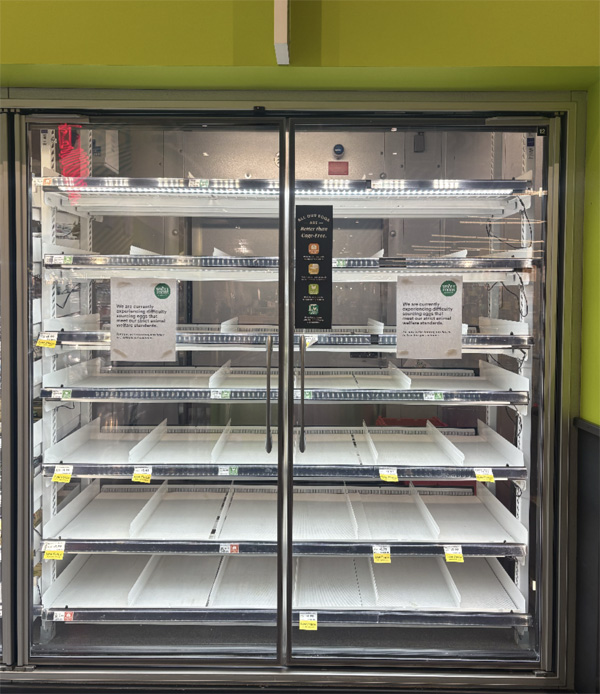California experiences severe egg shortage

[An image of an empty shelf of eggs in a store, Photo Credit: Sojin Kim]
Since late December 2024 to early January 2025, California has been experiencing a shortage of eggs throughout the state.
This crisis results from an avian flu outbreak across the nation.
According to the United States Department of Agriculture, there has been a notable drop in egg production levels, from 9.4 to 9.1 billion dozens of eggs.
Avian influenza is a type of H5N1 or HPAI, which mainly impacts chickens and other birds.
As of December 23, two months before the severe shortage began, the United States Department of Agriculture reported 37 human cases of this avian flu.
California officials confirmed that most of these cases originated with people’s exposure to infected cattle, and there have been no cases of human-to-human transmission yet.
Beyond California, numerous states are experiencing the same crisis, such as Ohio, Nevada, Kansas, Florida, and others.
Despite the concerns of whether milk is also unsafe to consume, authorities have announced that milk is safe due to the pasteurization process.
Many experts consider this outbreak of avian flu an unexpected development that has become one of the largest outbreaks of this disease.
The avian flu has appeared in both domestically raised and wild birds, along with domestically raised mammals.
The resulting egg shortage in California affects countless individuals, as many stores struggle to maintain supply.
Consequently, many customers encounter completely empty egg shelves.
Popular retailers such as Whole Foods, Sprouts, and Trader Joe’s also struggle to supply eggs.
When available, individuals are often limited to purchasing one egg carton per person.
Egg prices are reaching their peaks as stores attempt to limit purchases due to this shortage.
Some regions of the nation report that egg prices have almost doubled following the outbreak and shortage, compared to before these issues arose.
Restaurant owners face similar challenges, as they are not exempt from being unable to secure essential ingredients for their menus.
Those in the baking industry experience particularly severe impacts, because eggs have few viable substitutes in many recipes.
To adapt, some restaurants are seeking alternatives to eggs.
For instance, some establishments are temporarily using tofu in place of eggs.
The nation is still working to end this shortage, but resolution depends largely on when the outbreak among birds subsides.
In the meantime, egg prices will stay elevated until the disease affecting birds is contained.

- Sojin Kim / Grade 9 Session 8
- Homestead High School

![THE HERALD STUDENT REPORTERS [US]](/assets/images/logo_student_us.png)
![THE HERALD STUDENT REPORTERS [Canada]](/assets/images/logo_student_ca.png)
